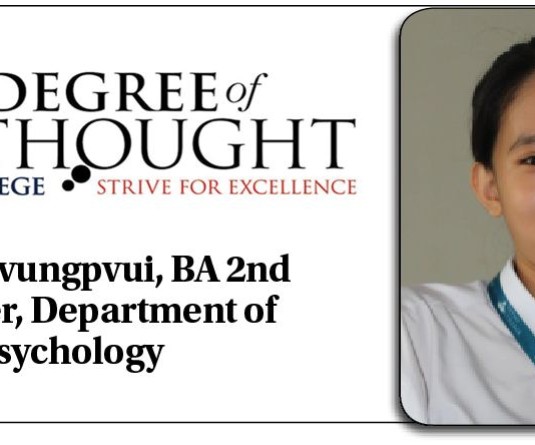
I strongly believe in the value of education and the power it has to change a lot of things in this world. But I also think that a lot can go wrong if we don’t do it correctly or if our concepts are not clear. By education I do not mean only formal academic education, but educating and spreading awareness about the right values, positivity and progressive mindsets.
When we think about Nagaland and the many problems we keep complaining about in our State, some of them justified and some of them maybe not, to name a few - challenges in the bureaucracy, infrastructure, lack of development, weak administration, poor work environment or nepotism, one would think that an education would help reduce these problems by producing individuals with the required skill sets or values or to come up with a system to fix, or solve these issues. Isn’t education, both academic and holistic supposed to do that? We spend our lives being educated. Rationally speaking, doesn’t that mean we should be equipped with the knowledge and ability to help confront these problems or improve the system we have by the time we are old enough to work?
While we cannot expect education to be like a magic potion that will make everything better, it is no doubt, a powerful tool with which nation building is strengthened. That is why we must ask the question - what kind of education are we imparting? Is it the kind where we will grow up to care enough about working for the development of society?
Individual success and achievement follows naturally with goals that envision the larger picture. The type of education implied here is one that is continuous and that promotes critical thinking, value creation and individual opinions. And maybe we are doing that to a certain extent - we have training programmes, awareness campaigns, capacity building initiatives and seminars that promote new learning and skills. But are they as impactful as they should be?
For anything concrete to materialize, we need skilled people in the work force. People who know what they are talking about. People who can change the opinions of other people in the right way. People with the skill set and the right passion to be able to put individualistic gains aside and think about the welfare of the society. This means that when it comes to learning, academic and holistic education are integral in building up an individual that lives by the right principles and correct values. It should be so deeply ingrained that they live these out of habit. To broadly categorise society, in the government, we have decision makers, policy creators, and implementers. In the field of education we have thinkers, skill builders and trainers. In the professional world, we have practitioners and professionalized expertise. The key and also the challenge would be in utilizing all these skilled resources from all three and working together to fulfil the common vision of a progressive, economically prosperous and positive society.
But if the government works closer together with educational institutions to help instil the needed skills and train minds towards adopting the right approach, and along with professional practitioners from different fields, wouldn’t the citizens of a state feel increasingly motivated and accountable towards good governance and citizenship. I believe it also narrows down to our fundamentals. If we are not clear about our concepts or the purpose we are trying to achieve, we falter and make bad choices that override our principles. We can say that we have forgotten our fundamentals when a government job is given to a tribesman from the same community or family member over a more deserving candidate or it could be when a parent requests that their child be given a pass certificate and promoted to the next class despite failing in the exam, and even though being promoted to the next class with no proper knowledge of subject matter would be more harmful in the long run. Not to point fingers here, but understanding that everyone has a reason for their actions – could be pressure from the community, owing a favour to someone or love/pity for the child - we need to figure out a way to make each other understand that in doing so we are also promoting a future of favouritism, inefficiency, and short-cuts that promote complacency.
To have strong fundamentals and concepts in place, we need to educate one another on processes or methods of functioning. It means that when new policies, projects or schemes are being initiated, we need to care enough to keep the checks and balances in place and follow up to ensure that they are being effectively managed and executed. Society, the youth, men and women all play a greater role than we actually have been in working together with the government to bring about progress and development.We talk about wanting to see a change in Nagaland. Then let’s keep on educating one another.
“Degree of Thought is a weekly community column initiated by Tetso College in partnership with The Morung Express. Degree of Thought will delve into the social, cultural, political and educational issues around us. The views expressed here do not reflect the opinion of the institution. Tetso College is a NAAC Accredited UGC recognised Commerce and Arts College. For feedback or comments please email: admin@tetsocollege.org”.






